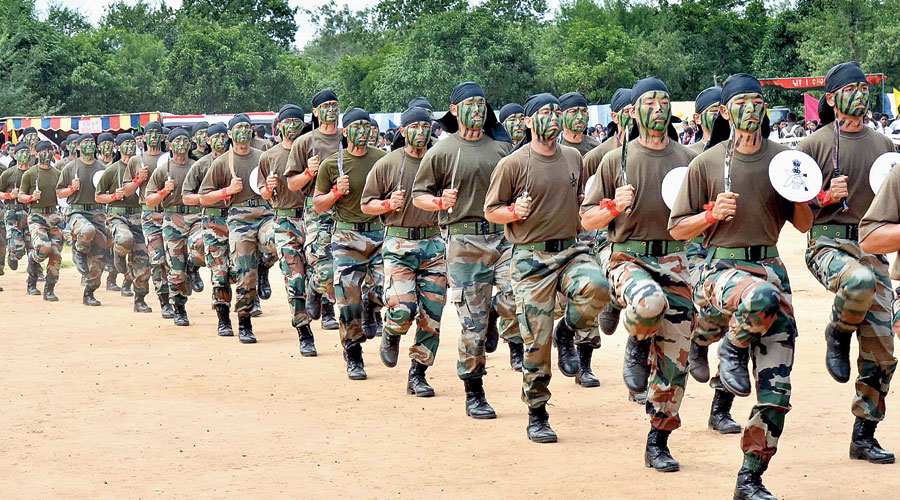The government will not take a call on recruitment of soldiers from Nepal under the new Agnipath scheme of India before the upcoming election.
Spokesperson at the Ministry of Foreign Affairs Sewa Lamsal holding regular press conference on Thursday has said that the issue of Gurkha soldiers in the Indian Army has been kept on hold.
“This issue has been kept on hold in a way to talk later. It will possibly come forward as the new government mulls what to do about it and how to move forward. It has been decided that the Government of Nepal will not initiate discussion on this issue for now,” Lamsal said. “The upcoming elected government will take decision on behalf of Nepal.”
Indian Army Chief General Manoj Pande, meanwhile, said that the vacancies allocated for soldiers from Nepal under its new Agnipath scheme will be allocated to others if Nepal does not take a decision in time.
He said that the vacancies allocated to Nepali Gurkhas will have to be “redistributed” to others for the time being if Kathmandu does not allow recruitment rallies as per the laid-down cutoff dates while replying to a question at a session in the United Service Institution of India on Wednesday, The Times of India reported.
“As per my sense, Nepal “is unlikely to take any decision before the general elections in the country on November 20. It’s a decision for them (Nepal) to take,” General Pande stated.
India has already clarified that recruitment of Nepalis in the Indian Army will also be done as per the Agnipath scheme recently announced by the Department of Military Affairs of India.
The Nepal government earlier suspended recruitment in the Indian Army citing lack of clarity about the Agnipath scheme recently announced by the Department of Military Affairs of India.
Foreign Minister Narayan Khadka summoned Indian Ambassador to Nepal Naveen Srivastava to the Foreign Ministry in August and informed that there will be no recruitment of Nepali youths for now due to lack of clarity about Agnipath scheme.
As announced by the Department of Military Affairs (DMA), the Agnipath plan has been brought to recruit 30,000-40,000 personnel below officer rank (PBOR) aged between 17.5 and 23 years annually for all three services, for a four-year tenure. They would receive IRs 1.171 million as a tax-free severance package after the end of four-year term and would not be entitled to pension and other retirement benefits.
“We will have to discuss with political parties and all the stakeholders concerned if Nepalis will also be recruited only for four years,” Minister Khadka reportedly told Srivastava. “We need not say anything if they are being recruited as per the tripartite treaty as that agreement is still in place.”
Nepali nationals can be recruited for military services in India and the United Kingdom as per the tripartite treaty between Nepal, Indian and the United Kingdom signed in 1947.
The Indian government writes to the Nepal government to make necessary security and other arrangements during the recruitment process every year. India had sent the letter even this year but the Indian correspondence did not clarify whether the recruitment will be as per Agnipath scheme or existing arrangements.
The Agnipath scheme, brought by the Indian government to cut the pension expenses that has been eating into the country’s defense budget even as it is struggling to keep up with the rocketing defense spending of hostile neighbor China, has been widely criticized in India including by former Indian Army officers but the government has gone ahead with the scheme.
Once those recruited under the scheme are discharged, 25% of them are re-inducted soon after to complete their ‘color service’ in the military for another 15 years, predicated on their previous performances, according to The Wire. This, in turn, would render them eligible for pension and attendant retirement benefits, but their previous four years would not be considered in determining these.
The remaining 75% would be demobilized, each receiving IRs 1.171 million as a tax-free severance package under the Seva Nidhi scheme, to which they would individually have contributed 30% of their monthly emoluments whilst in service. Their monthly salary for the first three years would be IRs 30,000, rising to IRs 40,000 in their fourth and final year. Alongside, all of them would be eligible for free medical benefits and risk and hardship, ration, uniform, travel and sundry allowances, as applicable to regular soldiers.

